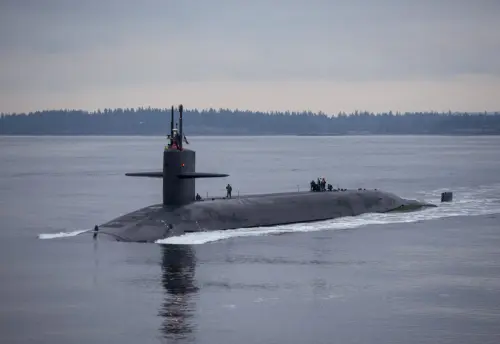Editor’s Note: With North Korea being blamed for the sinking of a South Korean ship, tensions are rising once again on the Korean Peninsula. Richard Bush channels the voice of Kim Jong-Il, explaining his perspective that condemnation will strengthen his nation’s internal solidarity, and that North Korea can circumvent the sanctions.
The current crisis reminds me of one of Mao Zedong’s favorite sayings, “There is great chaos under heaven and the situation is excellent.” By sinking a small naval vessel of the South Korean lackeys, I have created massive anxiety in Seoul, Washington, Beijing, and Tokyo. Everyone fears that the crisis will spin out of control, but they don’t want to appear weak. Mao would have been proud.
Now there was a leader. Mao didn’t care if a few people died of starvation. He knew how to deal with counterrevolutionary scum. And by taking risks he kept his adversaries off balance.
But my mind is wandering. That happens a lot these days.
Sinking the Cheonan and killing 46 sailors in the process has really roiled the South. The public is up in arms. The military wanted a quick retaliation. The opposition created doubts by charging that we weren’t responsible. “President” Lee Myung-bak has been on the defensive from the beginning. I must say that Lee did a good job of fabricating a lot of evidence against us, but we will deny it all. Lee is no match for me.
Then there are the Chinese. They did support the American imperialists after our missile and nuclear test a year ago, but they quickly returned to mollifying and indulging me. They sent emissaries, including their soft-hearted premier. They promised aid and business deals. They pleaded with me to return to the Six Party Talks. They even invited me to visit when they knew that the South’s report about Cheonan was imminent. That really made the lackeys mad, which is exactly what I hoped for. The Chinese are afraid of their own shadow.
It was precisely because China was trying to reconvene their precious Six Party Talks that I ordered the sinking of a Southern ship. I have no intention of returning to the talks because I have no intention of giving up my nuclear weapons and so have no desire to get drawn into a negotiation. One reason we did the missile and nuclear tests was to avoid negotiations last year. And when my generals tell me that we are ready to test again, we will do so, in part to perfect our deterrent and in part to roil the waters once again.
Sinking the Cheonan had a domestic value as well. There was a lot of grousing after that disastrous initiative to convert the currency (I don’t know why I let my stupid officials talk me into that idea!). What better way to end the criticism and instill than creating an external crisis?
I understand that this provocation may lead to condemnation and more sanctions. But that’s fine. Condemnation will strengthen our internal solidarity, and we can circumvent the sanctions. The Chinese will come around soon enough. By making the most of the limited power I have, I expose the powerlessness of others.
I am puzzled by the Americans’ response. I had expected Obama to back down from his firm stance of last year and beg us to re-engage. After Bill Clinton was here, I was sure that we were on the way to the bilateral talks I have always preferred and to more American aid. But it didn’t happen. I had hoped that Cheonan would cause a split between the Americans and the South, but that didn’t happen either. Obama has more backbone than I thought.
Obama’s policy also causes me to worry. He appears to understand, as others do not, that there is no way I will give up my nuclear weapons, and so sees no reason to bribe me into changing course. What worries me is that he has targeted the collective leadership that will replace me and rule in the name of my son. I fear that Obama is working steadily to create doubts in their minds about my tough approach, and so encourage them to give up our nuclear weapons and open up the country – which would lead to unmitigated disaster.
I worry that these people lack the revolutionary zeal to resist through whatever ruthless way possible such seduction. They will destroy everything that my father and I worked to accomplish. After all, the one thing that Mao Zedong could not dictate was what happened after he died.
The Brookings Institution is committed to quality, independence, and impact.
We are supported by a diverse array of funders. In line with our values and policies, each Brookings publication represents the sole views of its author(s).


Commentary
Op-edThe Mind of Kim Jong-Il II
May 25, 2010